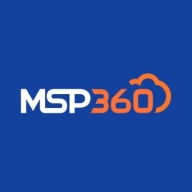

MSP360 Backup and Druva Phoenix are competing in the cloud data protection category. MSP360 Backup appears to have an upper hand in pricing and support, making it a budget-friendly option, while Druva Phoenix offers superior features that justify its higher price point.
Features: MSP360 Backup is recognized for its platform versatility, strong encryption, and ease of use across Windows, macOS, and Linux. It offers comprehensive email notifications, bandwidth management, and custom scheduling options. Druva Phoenix is notable for its advanced cloud-native architecture, automated backup processes, and robust disaster recovery options, catering to large enterprise needs with efficient scalability.
Room for Improvement: MSP360 Backup could enhance its integration features for seamless cloud connectivity and further polish its user interface for a smoother experience. It may also focus on expanding support for newer technology platforms. Druva Phoenix might improve by expanding its security features to cover more virtual environments and enhance its AI capabilities for more effective backup analytics. Additionally, simplifying the learning curve for new users can be beneficial.
Ease of Deployment and Customer Service: MSP360 Backup is praised for its intuitive deployment and strong customer support, facilitating quick setup and broad access to technical assistance. Its design allows for easy management without needing significant technical expertise. Druva Phoenix offers efficient deployment with automated systems, although it presents a learning curve for less experienced users. The system's comprehensive support aids in managing this complexity.
Pricing and ROI: MSP360 Backup is considered cost-effective with a quicker ROI due to its lower setup costs and flexible pricing model. It offers a notable advantage for smaller businesses or those with budget constraints. Druva Phoenix, though requiring higher upfront investment, presents a prolonged ROI through its extensive feature offering, making it suitable for enterprises seeking long-term value and comprehensive data protection solutions.
| Product | Market Share (%) |
|---|---|
| Druva Phoenix | 0.9% |
| MSP360 Backup | 1.1% |
| Other | 98.0% |


| Company Size | Count |
|---|---|
| Small Business | 4 |
| Midsize Enterprise | 3 |
| Large Enterprise | 2 |
| Company Size | Count |
|---|---|
| Small Business | 11 |
| Midsize Enterprise | 2 |
| Large Enterprise | 2 |
Druva Phoenix is a comprehensive cloud-based data protection and management solution that enables organizations to securely backup, recover, and manage their data across endpoints, physical servers, virtual machines, and cloud applications. With its scalable and flexible architecture, Druva Phoenix simplifies data protection and eliminates the need for traditional backup infrastructure.
By leveraging the power of the cloud, Druva Phoenix offers organizations a cost-effective and efficient way to protect their critical data. It provides automated backup and recovery capabilities, ensuring that data is always protected and easily recoverable in the event of a disaster or data loss. With its global deduplication and compression technology, Druva Phoenix minimizes storage requirements and reduces costs.
Druva Phoenix also offers advanced features such as point-in-time recovery, allowing organizations to restore data to a specific point in time, and granular file-level recovery, enabling users to recover individual files or folders. Its intuitive web-based console provides a centralized view of all protected data, making it easy to manage and monitor backups across the entire organization.
In addition to data protection, Druva Phoenix offers comprehensive data management capabilities. It enables organizations to gain insights into their data through advanced analytics and reporting, helping them make informed decisions and optimize their storage resources. Druva Phoenix also supports legal and compliance requirements by providing eDiscovery capabilities and ensuring data is retained and disposed of according to regulatory guidelines.
With its cloud-native architecture, Druva Phoenix offers organizations the flexibility to protect and manage their data across a wide range of environments, including on-premises, remote offices, and cloud applications such as Microsoft 365 and Google Workspace. It seamlessly integrates with popular cloud platforms like AWS and Azure, allowing organizations to leverage their existing cloud investments.
MSP360 Backup is a comprehensive data protection solution designed for businesses of all sizes. It offers a wide range of features and capabilities to ensure the safety and security of critical data.
With support for various storage destinations, including local drives, network shares, and cloud storage providers, MSP360 Backup provides flexibility and scalability. It also offers advanced scheduling options, allowing users to automate backups based on specific time intervals or events.
The solution supports both full and incremental backups, minimizing storage requirements and optimizing backup speed. MSP360 Backup also includes built-in encryption and compression, ensuring data privacy and reducing storage costs. Additionally, it offers easy file and folder recovery, allowing users to quickly restore lost or corrupted data.
With its intuitive user interface and robust set of features, MSP360 Backup is a reliable and efficient solution for businesses looking to protect their valuable data.
We monitor all Cloud Backup reviews to prevent fraudulent reviews and keep review quality high. We do not post reviews by company employees or direct competitors. We validate each review for authenticity via cross-reference with LinkedIn, and personal follow-up with the reviewer when necessary.